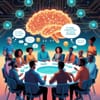In a world where communication is key, the rise of natural language processing (NLP) is transforming how we interact with technology. But what exactly is NLP, and how is it enhancing our ability to communicate with machines?
At its heart, natural language processing is a branch of artificial intelligence focused on enabling computers to understand, interpret, and respond to human language in a meaningful way. This technology bridges the gap between human communication and computer understanding, making it possible for machines to grasp the nuances of our language.
Imagine chatting with a virtual assistant or using a translation app to communicate with someone from another country. These everyday experiences are made possible by NLP. It allows computers to process and analyze vast amounts of text and speech data, learning from it to provide relevant responses.
One of the most significant applications of NLP is in customer service. Many companies are now employing chatbots that use NLP to handle inquiries and provide support. These chatbots can understand questions and offer solutions, often reducing wait times and improving customer satisfaction. They’re like having a personal assistant available 24/7!
NLP also plays a crucial role in sentiment analysis, which helps businesses understand how customers feel about their products or services. By analyzing reviews and social media posts, companies can gauge public opinion and make informed decisions based on consumer feedback.
Another exciting area is machine translation, where NLP helps break down language barriers. Services like Google Translate use advanced algorithms to convert text from one language to another, making global communication more accessible than ever.
Despite its remarkable capabilities, NLP is not without challenges. Language is full of subtleties, idioms, and cultural references that can confuse machines. However, ongoing research and advancements in deep learning are continuously improving NLP's accuracy and effectiveness.
The impact of natural language processing on our daily lives is profound. It not only enhances communication between humans and machines but also opens up new possibilities for interaction. As technology continues to evolve, NLP will likely become an even more integral part of our digital experiences.


